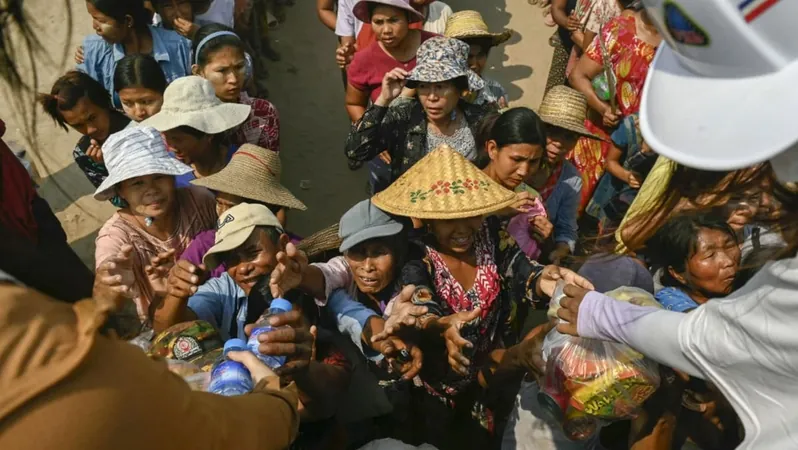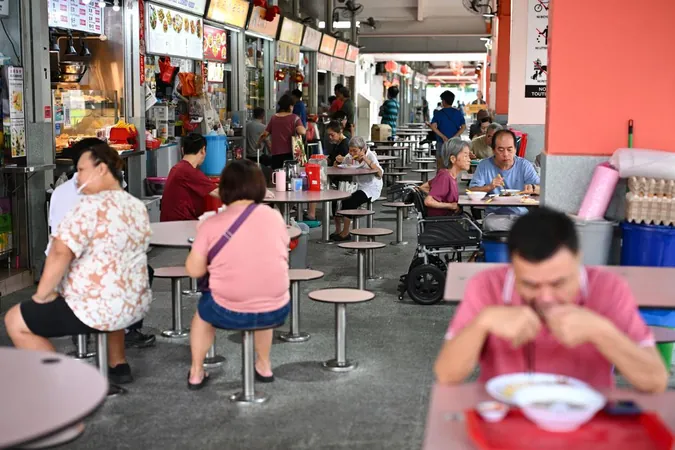
Outrage Erupts as Myanmar's Junta Chief Attends Summit Amid Earthquake Catastrophe
2025-04-04
Author: Wei Ling
BANGKOK
Tensions flared Friday (Apr 4) as protests erupted in Bangkok, where Myanmar's junta chief, Min Aung Hlaing, arrived to participate in a regional summit just days after a catastrophic earthquake devastated his country. Protesters condemned his presence, branding him a "murderer" against the backdrop of a humanitarian crisis that has left more than 3,000 confirmed dead in Myanmar.
The 7.7-magnitude earthquake wreaked havoc across communities, displacing millions and leaving countless survivors without basic needs like food and shelter. The United Nations reports that up to three million people have been affected, with entire neighborhoods reduced to rubble. As anger fills the air, criticism grows over the junta's lack of substantial aid efforts to the victims of the disaster.
Min Aung Hlaing's attendance at the lavish BIMSTEC summit in Bangkok—which featured high-profile meetings with leaders from neighboring countries—has been met with widespread outrage. Protesters displayed a banner declaring, "We do not welcome murderer Min Aung Hlaing," exemplifying the deep-seated frustrations of Myanmar's populace toward the military regime that has ruled with an iron fist since the 2021 coup.
The ongoing earthquake recovery efforts in Sagaing and Mandalay expose the military's inadequate response. Reports indicate that about 80 percent of buildings around Sagaing are severely damaged, stranding families in desperate situations. Witnesses recounted scenes of thousands scrambling for essential supplies, with many forced to sleep on the streets due to their homes being uninhabitable.
Despite international aid pouring in from various nations, including teams of citizen volunteers carrying food and water into devastated regions, the military's prioritization of political engagements over urgent humanitarian needs is drawing ire. One displaced survivor, cab driver Hla Myint Po, expressed the chaos that ensues when aid arrives, highlighting the struggle for resources amidst the widespread devastation.
As the summit's attendees dined in luxury at a $400-a-night hotel, Min Aung Hlaing attempted to engage in diplomatic discussions with fellow leaders, including India's Prime Minister Narendra Modi. Critics argue that these interactions risk legitimizing a regime widely accused of war crimes and human rights violations, especially against the Rohingya Muslim community.
The National Unity Government (NUG), Myanmar's opposition entity, has vocally condemned Hlaing's participation at the summit, calling it a "slap in the face" for those suffering under his regime's brutal grip. Yadanar Maung from the Justice for Myanmar campaign group labeled such diplomatic privileges for the junta chief as "deplorable.".
While the military regime faces intensified scrutiny and global sanctions, it has sought support from allies like China and Russia, reinforcing its hold amidst an ongoing multi-faceted civil war. The meeting in Bangkok represents a rare opportunity for Min Aung Hlaing to engage on an international platform outside of China, Russia, or Belarus since assuming power.
In response to the devastation caused by the earthquake, several armed groups involved in Myanmar's civil conflict called a temporary ceasefire to facilitate aid distribution. However, violence persists as conflicting factions remain armed and committed to defending their territories, leaving the situation fluid and fraught.
As the international community watches closely, calls for justice and accountability against the regime grow louder, with nations expressing hope that humanitarian needs take precedence over political agendas in the chaotic aftermath of the earthquake.



 Brasil (PT)
Brasil (PT)
 Canada (EN)
Canada (EN)
 Chile (ES)
Chile (ES)
 Česko (CS)
Česko (CS)
 대한민국 (KO)
대한민국 (KO)
 España (ES)
España (ES)
 France (FR)
France (FR)
 Hong Kong (EN)
Hong Kong (EN)
 Italia (IT)
Italia (IT)
 日本 (JA)
日本 (JA)
 Magyarország (HU)
Magyarország (HU)
 Norge (NO)
Norge (NO)
 Polska (PL)
Polska (PL)
 Schweiz (DE)
Schweiz (DE)
 Singapore (EN)
Singapore (EN)
 Sverige (SV)
Sverige (SV)
 Suomi (FI)
Suomi (FI)
 Türkiye (TR)
Türkiye (TR)
 الإمارات العربية المتحدة (AR)
الإمارات العربية المتحدة (AR)